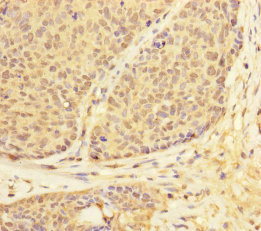Full Product Name
Rabbit anti-Homo sapiens (Human) USP28 Polyclonal antibody
Alternative Names
Deubiquitinating enzyme 28 antibody; KIAA1515 antibody; Ubiquitin carboxyl terminal hydrolase 28 antibody; Ubiquitin carboxyl-terminal hydrolase 28 antibody; ubiquitin carboxyl-terminal hydrolase 28 variant 1 antibody; Ubiquitin specific peptidase 28 antibody; Ubiquitin specific processing protease 28 antibody; Ubiquitin specific protease 28 antibody; Ubiquitin thioesterase 28 antibody; Ubiquitin thiolesterase 28 antibody; Ubiquitin-specific-processing protease 28 antibody; UBP28_HUMAN antibody; USP 28 antibody; USP28 antibody; USP28 protein antibody
Immunogen
Recombinant Human Ubiquitin carboxyl-terminal hydrolase 28 protein (430-580AA)
Immunogen Species
Homo sapiens (Human)
Purification Method
Antigen Affinity Purified
Concentration
It differs from different batches. Please contact us to confirm it.
Buffer
PBS with 0.02% sodium azide, 50% glycerol, pH7.3.
Tested Applications
ELISA, WB, IHC
Recommended Dilution
| Application |
Recommended Dilution |
| WB |
1:1000-1:5000 |
| IHC |
1:20-1:200 |
Storage
Upon receipt, store at -20°C or -80°C. Avoid repeated freeze.
Lead Time
Basically, we can dispatch the products out in 1-3 working days after receiving your orders. Delivery time maybe differs from different purchasing way or location, please kindly consult your local distributors for specific delivery time.
Usage
For Research Use Only. Not for use in diagnostic or therapeutic procedures.







